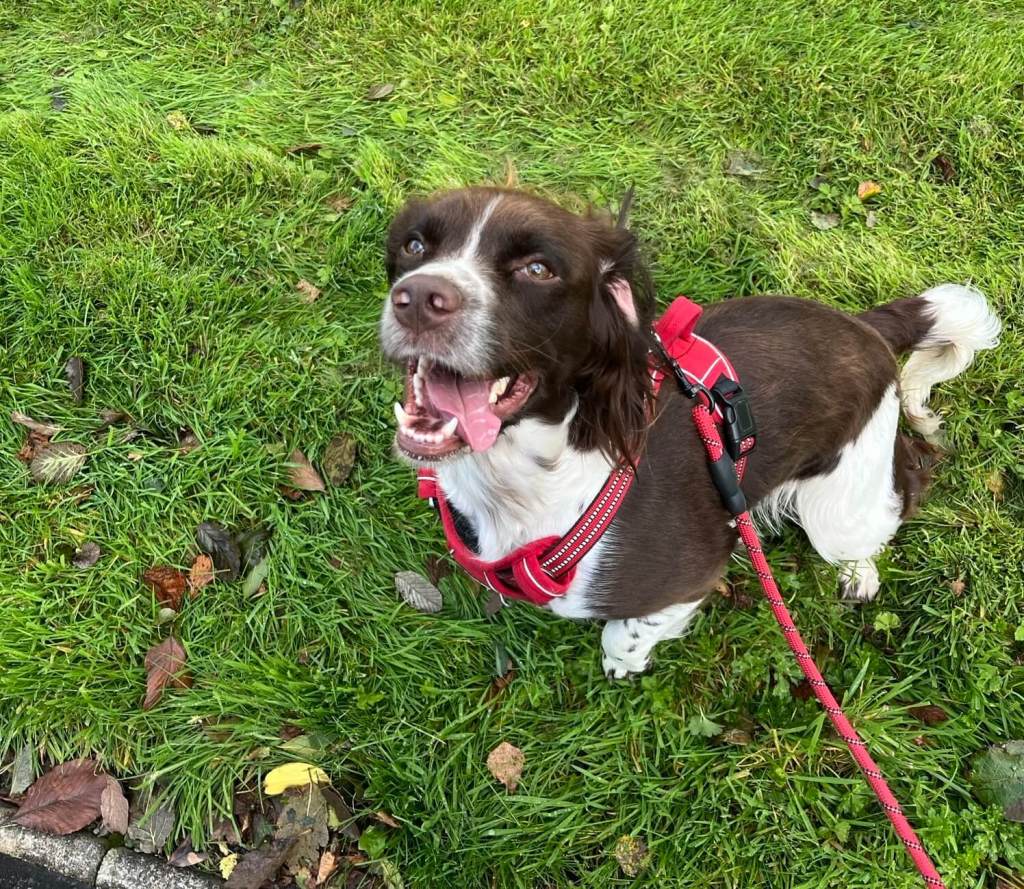Starting a dog walking business is an ideal move for budding entrepreneurs who love man’s best friend.
But there’s a lot to think about when considering how to become a dog walker. So we’ve put together a step-by-step guide covering everything from business plans to marketing and insurance for dog walkers, with tips from a professional dog walker.
- consider dog walking training and qualifications
- write a dog walking business plan
- explore DBS checks for dog walkers
- check dog walking rules and regulations
- get dog walking insurance
- work out dog walking fees
- get the right transport
- write a dog walking service agreement
- market your dog walking business
- keep on top of the day-to-day running of your business
How to start a dog walking business
Going self-employed and starting your own business gives you the freedom to be your own boss and choose which furry clients you want to work with. But the cliche is true – you have to put in the work to get the rewards.
“Starting out is the hardest part,” says Alison McGrady, owner of Bonnie Walks. “There’s a lot to think about – insurance and licences, for instance.”
“The biggest challenge I had was trying to get enough clients to be financially stable, as I only offer solo dog walks, mostly for rescue dogs or dogs that aren’t too social. I found a part-time job driving a local daycare’s clients home so I had a stable income while I built up my own clientele.”

Here’s what you should do when starting a dog walking business:
Step 1: Dog walking training and qualifications to consider
You don’t need training or qualifications to become a dog walker, but having them can give you more credibility when building your client base. It can make your business appear more professional when you mention your qualifications in your marketing.
But most importantly, you’ll have the confidence that you’re offering a great service and that you can really look after the animals in your care.
Animal first aid, animal behaviour, and animal care are just some of the training and qualifications you can add to your CV.
These City and Guilds qualifications are offered in colleges and centres across the country:
- Level 2 Certificate Of Technical Competence In Dog Walking
- Level 2 Certificate of Technical Competence in Pet Sitting
- Level 2 Certificate of Technical Competence in Animal Health, Husbandry and Handling
- Level 3 Certificate of Technical Competence in Animal Nutrition
Other highly rated courses include the Think Dog! certificate and the programmes available at trade association NarpsUK(National Association of Pet Sitters and Dog Walkers) and Compass.
Step 2: Write a dog walking business plan
Writing a business plan before you start out helps you identify the opportunity, your competitors, and how you’ll actually run your business. Doing this at the beginning of the process lets you answer all the necessary questions and tackle any potential problems early. You might also decide to offer dog grooming services.
“You need to decide what kind of dog walker you want to be,” says Alison. “Do you want to do solo walks or group walks, for instance, and what does this mean for your business?”
Read more about writing a business plan.
Step 3: Explore DBS checks for dog walkers
If you’re holding a dog owner’s keys and going into their house, you’ll need a Criminal Record Check. For jobs in England and Wales you can request a basic Disclosure and Barring Service check for £23.
There’s a different application process if your business is in Northern Ireland or Scotland. You’ll need to have lived at your current address for more than a year to apply online with Disclosure Scotland for a Basic Disclosure, which costs £25. While for AccessNI, a basic check costs £18.
If you’ve lived at your address for under a year, you can apply for a Criminal Record Check through NarpsUK for £65.

Step 4: Dog walking rules and regulations to check
NarpsUK has lots of information on how to start a dog walking business, and they’re especially helpful when it comes to understanding the key rules and regulations.
Some of these rules include:
- meeting owners prior to the first booking
- restricting the number of dogs walked to no more than four at a time
- keeping records of all work undertaken
- protecting clients’ personal information
- making sure all dogs in public are wearing a collar with the owner’s name and address on it
- cleaning up faeces (if you don’t do this, you could be fined up to £1,000)
- if you’re offering a dog boarding service too, you need a licence
You don’t have to, but joining NarpsUK gives you access to lots of help and advice on setting up a dog walking business. Telling your clients you’re a member can also give them peace of mind.
Step 5: Get dog walking insurance
Dog owners put you in charge of their pets, which means they expect you to be careful and reliable.
Getting a tailored dog walking insurance policy policy can help you show clients that you’re serious about your work. We explain more about business insurance at the end of this guide.
Step 6: Work out how much you’re going to charge
The average cost of dog walking is £10-£20 per hour, per dog, according to dog walking service Bark.
If you’re walking more than one dog at once, this means you could earn a significant amount. But these rates can fluctuate depending on your business overheads, the number of dogs you take per walk, and the number of hours you walk per day. Also be prepared to negotiate on price with your clients.
Rates can also vary by location, and the nature of the business means that there is no set rate you should be charging. Research here is key – find out what similar businesses are charging by calling them and setting your rates accordingly.
When you’re just starting out, you might consider offering introductory rates to drive new business.
Step 7: Get the right transport
While you could use public transport to get you and the dogs around (for instance, if you live in a well-connected city), it’s much easier if you have your own vehicle – especially if you don’t live near spaces where you can take them for a walk.
Step 8: Write a dog walking service agreement
Having a written agreement between you and your clients is a good idea as it can protect your business if there are any disagreements or disputes.
Your agreement should include a summary of the service and your responsibilities, including how much the client is paying you and when and how far the walks will be. You can also include details about the dog and whether it has any specific needs.

Step 9: Market your dog walking business
There are a number of ways you can advertise your dog walking business.
Social media – do you know your TikTok from your Instagram? Videos can be especially powerful for dog walkers, because you get to share cute stories from your walks. Having a social media presence across a few platforms can help you reach a large number of clients.
Alison recommends keeping things personal and local when advertising your dog walking business on social media.
“My first post was all about my reason for starting my dog walking business (I struggled to find a dog walker who would take my reactive rescue dog). I then joined all of the local Facebook groups and shared my page in them all multiple times.”
Set up a business website – it’s important to have an online presence – have a look at our best website builders guide to get started on creating your business website.
Collect testimonials – testimonials from existing clients give you an edge, wherever you choose to use them – you can add them on your website, social media account, and flyers. To collect testimonials, hand out comment cards, ask for comments online, or just gather them in person.
Ask for referrals – referrals are one of the most powerful ways to grow a business – a global Nielsen report found 92 per cent of people trust recommendations from family or friends more than advertising.
“World of mouth is one of the best ways to promote your services,” says Alison.
Find a niche – a niche or gap in the market could help your business stand out from the crowd. Are there any similar businesses in your area, and why will yours be better? Could you focus on particular breeds? Do market research and consider offering other services, such as pet grooming, to help win business.
“Make friends with the other dog walkers in your area,” Alison recommends. “So if one person doesn’t offer that service or doesn’t have the space available, you can pass them over to each other.”
Focus on customer service – listen to the needs of your clients, give a highly personal service, and deal with any issues promptly. Always keep in mind that your clients’ pets are treasured members of their family.
Step 10: Keep on top of the day-to-day running of your business
Dog walking might not seem like a business in the traditional sense, but it’s still a business. You have to keep on top of running it, including:
- going self-employed in the first place, from registering with HMRC to choosing a legal structure for your business
- keeping accurate records and filing your Self Assessment tax return on time each year
- your small business accounting and setting up a business bank account to keep your personal finances separate
- keep a business budget and track your income and expenses
- to grow your business and get your name out there, you should market yourself – network with your clients and other businesses who may be interested in working with you.
Do I need dog walking insurance?
As mentioned above, you should think about dog walking insurance when setting up your dog walking business.
A comprehensive dog walking business insurance policy can protect you in case something goes wrong. With us you can combine the covers you need into one policy.
Some key covers to consider:
- public liability insurance can cover you if you cause damage to third party property, or injure a member of the public
- employers’ liability insurance is usually a legal requirement if you have employees
- business equipment cover covers any expensive equipment you use for your business (whether that’s a laptop or something more specific)
- business legal protection covers legal expenses or prosecution fees for situations like employment tribunals or civil actions brought under the Data Protection Act
- personal accident insurance can pay compensation for accidental injury or even death
Are you looking to set up a dog walking business? Let us know how you get on in the comments.
More guides for small business owners
- How to start a dog grooming business
- 7 of the best business loans compared
- Self-employed business ideas in the UK
- Is business insurance a legal requirement?
Insure your dog walking business
You can build a tailored dog walking insurance policy choosing from a range of expert cover options, starting with public liability insurance. Run a quick quote to get started.
Photograph: Monkey Business/stock.adobe.com
